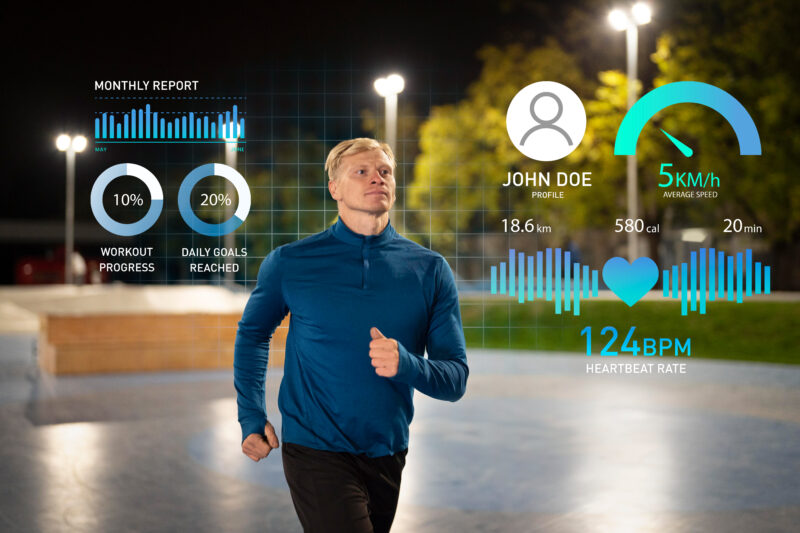Executive Summary:
AI redefines the sports industry, developing spectator engagement, performance analysis, injury prevention, and even how games are refereed.
Introduction:
Since the introduction of AI, the sports sector has developed beyond all recognition over time.
Artificial intelligence in sports has had a big impact on everything from helping athletes become better to increasing fan engagement and even changing how games are called.
In this blog, we’ll examine how AI is reshaping and redefining the sports industry, using examples from the real world to highlight its revolutionary impact.
AI’s Role in Sports Performance Enhancement
Having a competitive edge might mean the difference between success and failure in the fast-paced world of sports.
In this field, artificial intelligence (AI) has become a game-changing force that is assisting athletes and coaches in reaching new levels of performance.
AI in sports provides data-driven insights that change how athletes hone their abilities and plans while establishing a new benchmark for performance.
AI in sports has emerged as a helpful ally for trainers and coaches. They may monitor and evaluate each athlete’s physical state and performance, as well as that of the team as a whole.
Important choices regarding training schedules and game strategies are informed by this data-driven approach. Coaches may maximize the potential of their teams by making well-informed decisions based on patterns and trends they can find in performance data.
Sports Injury Prevention and Rehabilitation
The actual power of AI in sports injury prevention comes in its prediction skills. AI can spot patterns in an athlete’s biological data over time that can point to an upcoming injury. For example, it can spot overuse injuries, musculoskeletal imbalances, or indicators of exhaustion that would not be visible to the human eye. With this information at hand, teams and medical personnel can take preventative action to deal with these problems before they develop into serious ailments.
This is a fundamental change in how injury prevention is done. In the past, athletes frequently had to rely on their own subjective perceptions or the findings of trainers and medical professionals.
The introduction of an objective and data-driven approach using AI in sports has modified the rules and improved both injury prevention and the career length of athletes.
Additionally, AI-assisted injury prevention goes beyond just seeing possible problems. It is crucial to create individualized rehabilitation plans for wounded sportsmen.
An athlete’s injuries, physical state, and progress can all be thoroughly analyzed by AI, which can then suggest personalized training and recuperation plans.
AI in Sports Officiating: Changing the Rules of the Game
AI redefines the sports industry, expanding its influence in sports beyond its effects on players and teams.
The use of AI in officiating has enormous consequences. Sports scandals have significantly decreased as a result. AI in sports makes sure that decisions are founded on facts rather than opinions by supplying objective and unquestionable data.
This degree of accuracy has increased the games’ fairness while also improving viewers’ viewing pleasure. AI in sports officiating represents a significant advancement, improving games’ excitement, fairness, and transparency.
Using AI to Increase Fan Engagement in Sports
In the world of sports, interactive applications, personalized content recommendations, and AI-driven chatbots are quickly taking over.
By adjusting material and interactions to individual preferences, these technologies deliver a more engaging and personalized fan experience.
Real-time game updates, queries, and dynamic, individualized fan engagement are all possible with chatbots. Fans and their preferred sports, teams, and athletes can interact on a deeper level thanks to this individualized approach.
AI in sports fan interaction improves the viewing experience by making it more participatory as well as more fun. Fans can interact with the action in real-time, get closer to the action, and get pertinent information, giving them a sense of being a vital part of the game.
Sports betting with AI
The impact of AI in sports on sports betting is another fascinating aspect of the technology.
AI in sports betting helps both inexperienced and seasoned gamblers. It is capable of spotting patterns and trends that might not be obvious to human bettors by processing and analyzing vast amounts of historical and real-time data.
Betting decisions are made with greater knowledge as a result of the improved data analysis, potentially boosting the likelihood of success.
The excitement that data-driven AI brings to sports betting isn’t just about winning; it’s also about improving the fan experience.
The Future of AI in Sports
AI in sports will only become more influential as it develops. It is clear that artificial intelligence is changing how we see and engage with sports.
AI is becoming more and more ingrained in the sports industry, impacting everything from injury prevention and performance optimization to fan engagement and sports betting.
AI’s role in sports is positioned to continue expanding and reshaping the sector in unexpected ways, whether it’s assisting athletes in achieving their optimum performance or keeping spectators on the edge of their seats.
There is little doubt that sports will have a high-tech future, and AI is at the vanguard of this fascinating change.
Conclusion:
In conclusion, artificial intelligence in sports is no longer a passing trend. It’s a fundamental force that is changing the way we participate in, watch, and play sports.
AI is undoubtedly revolutionizing the sports industry by improving player performance, ensuring correct officiating, and upgrading the fan experience. Without a doubt, technology will play a major role in the future of sports, and AI is paving the way.
AI in sports is here to stay and will make our games better, safer, and more fascinating than ever in a world where data and precision matter more than ever.
One thing is certain: thanks to the power of artificial intelligence, sports have a brighter and more innovative future than ever as AI redefines the sports industry.










